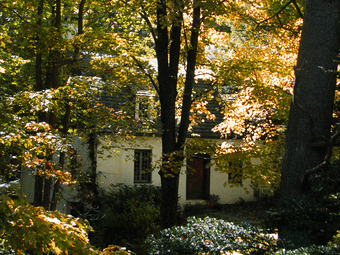Plaster House facts for kids
Quick facts for kids |
|
|
Plaster House
|
|
 |
|
| Location | 117 Plaster House Rd., Southbury, Connecticut |
|---|---|
| Area | 9.9 acres (4.0 ha) |
| Architectural style | Colonial |
| NRHP reference No. | 93000660 |
| Added to NRHP | July 29, 1993 |
The Plaster House is a very old and special house located at 117 Plaster House Road in Southbury, Connecticut. It was likely built in the mid-1700s. This house is a rare example of stone buildings from the 18th century in Connecticut. It might have started as a farm building for the important Hinman family. The Plaster House was added to the National Register of Historic Places in 1993.
Contents
Discovering the Plaster House
The Plaster House sits in a quiet, country area of Southbury. It is on the south side of Plaster House Road. The house overlooks Jeremy Brook, a small stream, to the east.
What Makes This House Unique?
This house is quite small, with one and a half stories. It is built from small, rough stones. These stones are covered with a smooth plaster-like material called stucco. The roof has a special shape called a gambrel roof. Two small dormer windows stick out from the roof. Stone chimneys are found at each end of the house.
The front of the house has three sections. Windows are on both sides of the main entrance. The west side of the house is made of stone. The east side is made of wood and covered with clapboards.
A Glimpse Inside the Plaster House
Inside, the house has two main rooms. The larger room was likely used as a parlor, like a living room. The smaller room served as a kitchen. What's really interesting is the stonework of the chimney and fireplaces. It is fully visible inside. This is very unusual for houses built so long ago. It seems this was how it was originally built.
Who Lived Here? A Look at Its History
We don't know the exact year the Plaster House was built. But experts believe it was no later than 1750. An architect named J. Frederick Kelly thought it was built around 1720. He based this on how the house was designed.
The Hinman family owned this property for many years. They were one of the first families to settle in this area. Family stories say that Benjamin Hinman, a soldier in the American Revolutionary War, was born here. Jeremy Swamp Road, which is now a dirt path, used to be a very important road. The house was also connected to a mill. The remains of this mill are further down Jeremy Brook. Part of the bridge on Plaster House Road is actually made from the old mill's dam.
The Plaster House is very special because it's made of stone. Most houses in colonial Connecticut were built from wood. Stone construction was not common back then. This makes the Plaster House a rare and important piece of history.
 | Janet Taylor Pickett |
 | Synthia Saint James |
 | Howardena Pindell |
 | Faith Ringgold |



